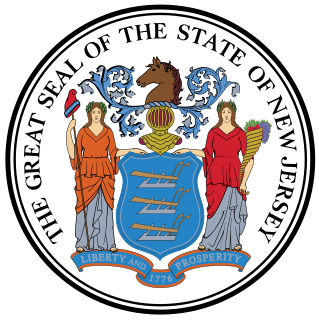Primary elections or often just primaries, are the process by which voters can indicate their preference for their party's candidate, or a candidate in general, in an upcoming general election, local election, or by-election. Depending on the country and administrative divisions within the country, voters might consist of the general public in what is called an open primary, or solely the members of a political party in what is called a closed primary. In addition to these, there are other variants on primaries that are used by many countries holding elections throughout the world.
Independent or Independents may refer to:

The American Independent Party (AIP) is a far-right political party in the United States that was established in 1967. The AIP is best known for its nomination of former Governor George Wallace of Alabama, who carried five states in the 1968 presidential election running on a segregationist “law and order” platform against Richard M. Nixon and Hubert H. Humphrey. The party split in 1976 into the modern American Independent Party and the American Party. From 1992 until 2008, the party was the California affiliate of the national Constitution Party. Its exit from the Constitution Party led to a leadership dispute during the 2016 election.
In the United States, ballot access refers to the rules and procedures regulating the conditions under which a candidate, political party, or ballot measure is entitled to appear on voters' ballots. As the nation's election process is decentralized by Article I, Section 4, of the United States Constitution, ballot access laws are established and enforced by the states. As a result, ballot access processes may vary from one state to another. State access requirements for candidates generally pertain to personal qualities of a candidate, such as: minimum age, residency, citizenship, and being a qualified voter. Additionally, many states require prospective candidates to collect a specified number of qualified voters' signatures on petitions of support and mandate the payment of filing fees before granting access; ballot measures are similarly regulated. Each state also regulates how political parties qualify for automatic ballot access, and how those minor parties that do not can. Fundamental to democracy, topics related to ballot access are the subject of considerable debate in the United States.
Political party strength in U.S. states refers to the level of representation of the various political parties of the U.S. in each statewide elective office providing legislators to the state and to the U.S. Congress and electing the executives at the state and national level.
An independent or nonpartisan politician is a politician not affiliated with any political party. There are numerous reasons why someone may stand for office as an independent.
An independent voter, often also called an unaffiliated voter in the United States, is a voter who does not align themselves with a political party. An independent is variously defined as a voter who votes for candidates on issues rather than on the basis of a political ideology or partisanship; a voter who does not have long-standing loyalty to, or identification with, a political party; a voter who does not usually vote for the same political party from election to election; or a voter who self-describes as an independent.
New Jersey is one of the fifty U.S. states. The state is considered a Democratic stronghold, since it has consistently voted for Democrats in presidential elections since 1992.
Decline to State (DTS) is an affiliation designation on the California voter registration form that allows voters to register to vote without choosing a party affiliation. It is similar to what in other states would be called declaring oneself as an independent.
The New Jersey Conservative Party, once known as the NJCP, now CP-NJ is a conservative political party in New Jersey, United States.
An open primary is a primary election that does not require voters to be affiliated with a political party in order to vote for partisan candidates. In a traditional open primary, voters may select one party's ballot and vote for that party's nomination. As in a closed primary, the highest voted candidate in each party then proceeds to the general election. In a nonpartisan blanket primary, all candidates appear on the same ballot and the two highest voted candidates proceed to the runoff election, regardless of party affiliation. The constitutionality of this system was affirmed by the Supreme Court of the United States in 2008, whereas a partisan blanket primary was previously ruled to be unconstitutional in 2000. The arguments for open primaries are that voters can make independent choices, building consensus that the electoral process is not splintered or undermined by the presence of multiple political parties.

Voter registration in the United States is the voter registration that is required for voting in federal, state and local elections in the United States. The only exception is North Dakota, which does not require registration, although North Dakota law allows cities to register voters for city elections. Voter registration takes place at the county level in many states and at the municipal level in several states. Most states set cutoff dates for voter registration, ranging from 2 to 4 weeks before an election; while a third of states have Election Day or "same-day" voter registration which enables eligible citizens to register or update their registration when they vote before or on Election Day.

Parliamentary elections were held in Russia on 12 December 1993. They included the last elections to the Federation Council of Russia.
Independent Liberal is a description allowed in politics to denote party affiliation. It is used to designate a politician as a liberal, yet independent of the official Liberal Party of a country. Those parties were the Liberal Party of Canada, or the Liberal Party of the United Kingdom, or the New Zealand Liberal Party.
Apoliticism is apathy or antipathy towards all political affiliations. Being apolitical can also refer to situations in which people take an unbiased position in regard to political matters. The Collins Dictionary defines apolitical as "politically neutral; without political attitudes, content, or bias".

Elections in New Jersey are authorized under Article II of the New Jersey State Constitution, which establishes elections for the governor, the lieutenant governor, and members of the New Jersey Legislature. Elections are regulated under state law, Title 19. The office of the New Jersey Secretary of State has a Division of Elections that oversees the execution of elections under state law. In addition, the New Jersey Election Law Enforcement Commission (ELEC) is responsible for administering campaign financing and lobbying disclosure.
Surveys show that Americans without a religious affiliation, sometimes referred to as "Nones" range around 23.8%, 26%, 24.8%, 33%, 21%, and 31.4% of the population, with 'nothing in particulars' making up the majority of this demographic. Since the early 1990s, independent polls have shown the rapid growth of those without a religious affiliation.

General elections for the National Assembly were held in Siam on 6 January 1946. In the first elections since the Second World War, a total of 2,091,788 votes were cast and voter turnout was 32.5%. A second round of elections was held in 47 provinces on 5 August in order to increase the number of MPs to the number set in the constitution.
The independent voting movement is a group of progressive, anti-party, left/center/right alliance, independent voters in the United States seeking to reform the two-party electoral process at all levels of government. The primary organizing entity for the movement is the Committee for a Unified Independent Party (CUIP), and its Internet presence, independentvoting.org. Their mission is to "develop a movement of independent voters for progressive post-partisan reform of the American political process".

Susannah M. Whipps is a member of the Massachusetts House of Representatives, first sworn in on January 7, 2015. A seventh generation resident of Athol, Massachusetts, she was elected as a Republican to represent the 2nd Franklin District. The 2nd Franklin District consists of 12 communities in central and western Massachusetts. Rep. Whipps serves on the Joint Committee on Mental Health and Substance Abuse, Joint Committee on Municipalities and Regional Government, Joint Committee on Elder Affairs, and the Joint Committee on State Administration and Regulatory Oversight. She also serves on the Statewide Taskforce on Child Sexual Abuse Prevention. Whipps is a co-owner of Whipps, Inc. a local stainless-steel equipment manufacturer.





